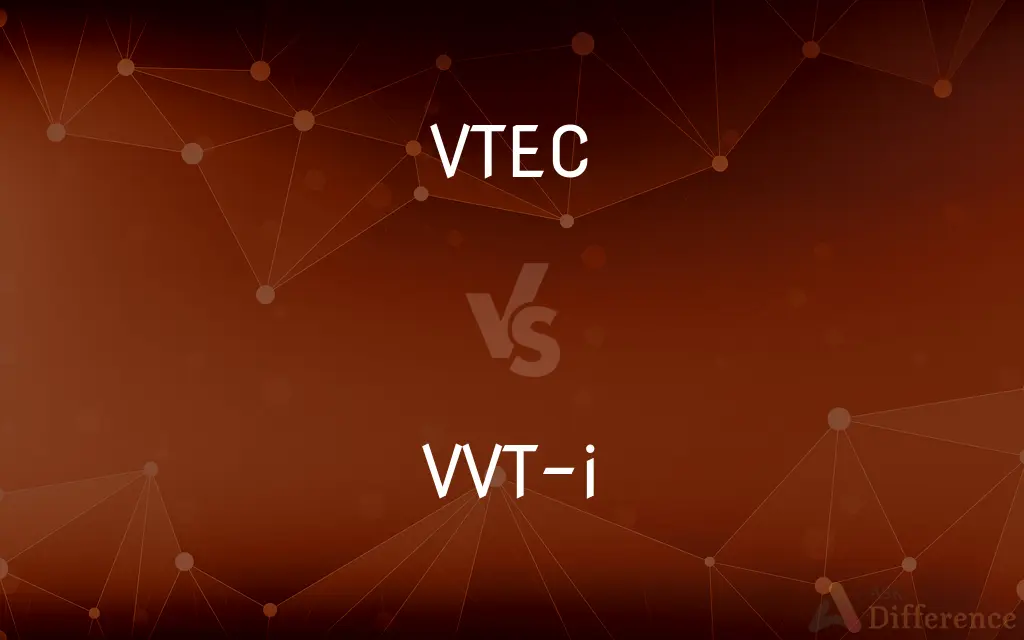VTEC vs. VVT-i — What's the Difference?
By Tayyaba Rehman & Fiza Rafique — Published on February 16, 2024
VTEC (Variable Valve Timing and Lift Electronic Control) is Honda's technology optimizing engine performance by changing the valve timing and lift. VVT-i (VVT with intelligence) is Toyota's technology that adjusts the timing of the intake valves.

Difference Between VTEC and VVT-i
Table of Contents
ADVERTISEMENT
Key Differences
VTEC and VVT-i are both technologies designed to improve vehicle engine efficiency and performance by optimizing valve timing. VTEC, developed by Honda, not only adjusts the timing but also changes the lift of the engine valves. This dual adjustment allows Honda engines to offer low-end torque and high-end power, making them versatile across a wide range of operating conditions. The technology is particularly noted for delivering a noticeable "kick" in power at higher RPMs, a characteristic that has made it popular among car enthusiasts.
VVT-i, Toyota's answer to variable valve timing, focuses on continuously adjusting the timing of the intake valves to ensure optimal performance at all engine speeds. While it doesn't alter valve lift like VTEC, VVT-i still significantly enhances engine performance, fuel efficiency, and reduces emissions. The "intelligence" in VVT-i refers to the system's ability to adjust timing on the fly based on driving conditions, which improves the vehicle's overall responsiveness.
One of the main differences between the two systems is how they impact engine performance characteristics. VTEC engines are known for their high-RPM performance boost, making them feel more aggressive when the technology kicks in. In contrast, VVT-i engines offer a smoother acceleration curve, focusing on overall efficiency and a more uniform delivery of power.
In terms of application, VTEC has been utilized in a wide range of Honda vehicles, from economy cars to high-performance sports cars. VVT-i, on the other hand, is found across Toyota's lineup, emphasizing the brand's focus on reliability and fuel economy. Both technologies represent their manufacturers' commitment to combining performance with environmental responsibility.
Choosing between a vehicle with VTEC or VVT-i will depend on the driver's preferences for engine performance, the driving experience, and brand loyalty. Both systems have proven their effectiveness in enhancing engine capability and efficiency, making them valuable features in their respective brands.
ADVERTISEMENT
Comparison Chart
Primary Function
Adjusts valve timing and lift
Adjusts valve timing
Performance Boost
Noticeable at high RPMs
Smooth across all RPMs
Fuel Efficiency
Enhanced at varying speeds
Consistently improved
Emissions
Reduced
Significantly reduced
Typical Application
Broad range, including sports cars
Wide range, focusing on efficiency
Compare with Definitions
VTEC
Changes valve timing and lift.
VTEC adjusts both timing and lift for better engine efficiency.
VVT-i
Provides a uniform power delivery.
Acceleration is smooth across all speeds with VVT-i.
VTEC
Honda's engine technology optimizing performance.
My car's VTEC system engages at high RPMs for extra power.
VVT-i
Toyota's variable valve timing technology.
VVT-i in my Toyota ensures smooth and efficient performance.
VTEC
Known for a power surge at higher speeds.
You can really feel the VTEC kick in during acceleration.
VVT-i
Focuses on optimizing valve timing.
VVT-i constantly adjusts intake valve timing for optimal power.
VTEC
Used in a variety of Honda models.
From Civics to NSXs, VTEC is a hallmark of Honda performance.
VVT-i
Utilized across Toyota's vehicle range.
From the Corolla to the Land Cruiser, VVT-i is key to Toyota's efficiency.
VTEC
Enhances both power and fuel economy.
VTEC technology provides the best of both worlds: power and efficiency.
VVT-i
Improves fuel efficiency and emissions.
Thanks to VVT-i, my car has lower emissions and great mileage.
Common Curiosities
Which technology offers better fuel efficiency?
Both improve fuel efficiency, with VVT-i specifically focusing on this aspect.
Which system is better for performance cars?
VTEC is often associated with performance cars due to its high-RPM power boost.
Is VVT-i only used by Toyota?
Yes, VVT-i is Toyota's proprietary technology, though other manufacturers have similar systems.
Do these technologies require special maintenance?
Regular maintenance is recommended, but no special extra care is needed due to these technologies.
Can I notice when VTEC kicks in?
Yes, there's often a noticeable increase in power at higher RPMs with VTEC.
Is VVT-i better for city driving?
Its focus on efficiency and smooth power delivery makes VVT-i well-suited for city driving.
Can VTEC and VVT-i improve engine longevity?
By optimizing engine performance and efficiency, both technologies can contribute to longer engine life.
Are there different versions of VTEC and VVT-i?
Yes, both technologies have evolved over time with various iterations.
Which technology is older, VTEC or VVT-i?
VTEC was introduced first, in the late 1980s.
Do all Honda and Toyota cars use VTEC and VVT-i?
Many models use these systems, but not necessarily all.
Share Your Discovery

Previous Comparison
Which vs. In Which
Next Comparison
Alexander The Great vs. Napoleon BonaparteAuthor Spotlight
Written by
Tayyaba RehmanTayyaba Rehman is a distinguished writer, currently serving as a primary contributor to askdifference.com. As a researcher in semantics and etymology, Tayyaba's passion for the complexity of languages and their distinctions has found a perfect home on the platform. Tayyaba delves into the intricacies of language, distinguishing between commonly confused words and phrases, thereby providing clarity for readers worldwide.
Co-written by
Fiza RafiqueFiza Rafique is a skilled content writer at AskDifference.com, where she meticulously refines and enhances written pieces. Drawing from her vast editorial expertise, Fiza ensures clarity, accuracy, and precision in every article. Passionate about language, she continually seeks to elevate the quality of content for readers worldwide.
















































